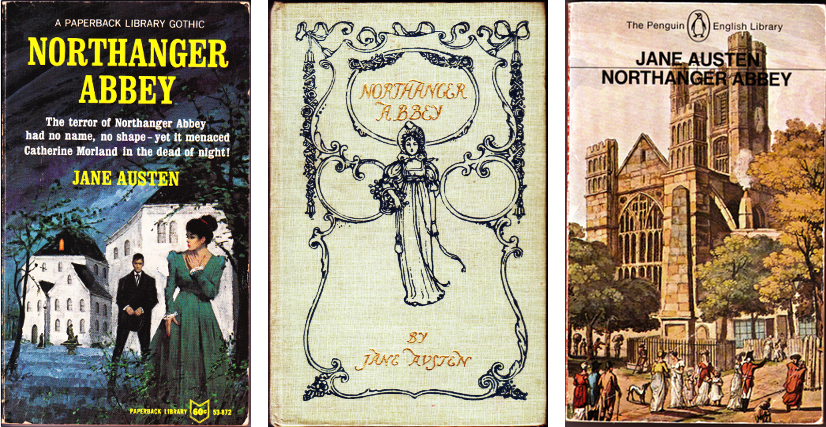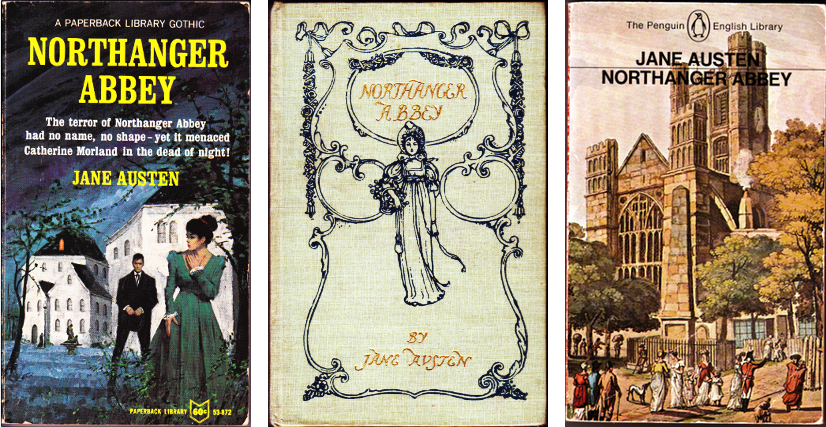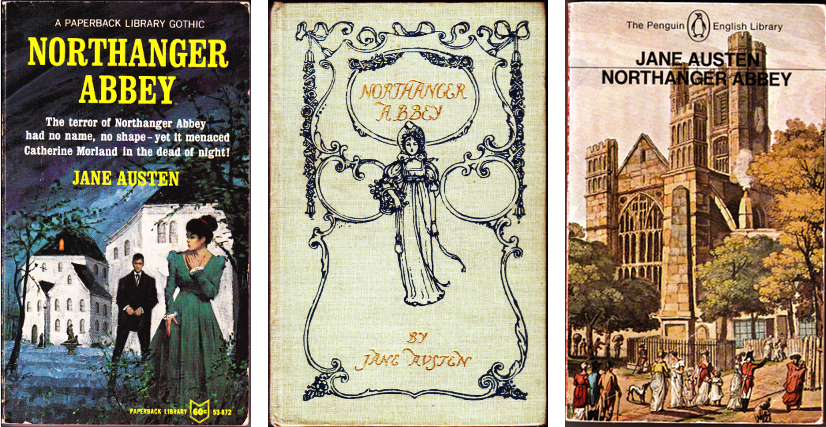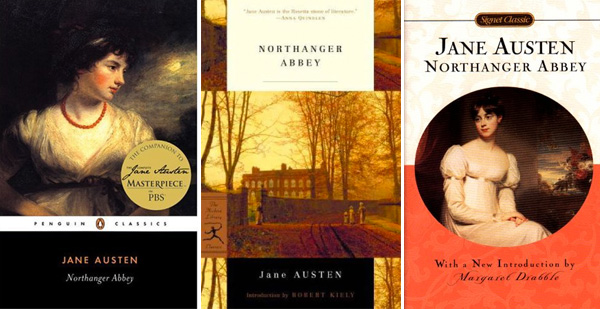IN TRAINING FOR A HEROINE: THE GREAT NORTHANGER ABBEY RE-READ, PART V
Covers from Jane Austen to Cover
Welcome to the penultimate episode of our Northanger Abbey recap! It took a while, but we’ve finally made it to the eponymous Abbey! What horrors and mysteries lay in wait? Let’s find out.
Chapter 21
Upon arriving at the Tilney homestead, Catherine is shown to her rooms. They’re nothing like the dark, dank chamber Henry was describing in his spooky story, but there is, however, a big chest that looks mysteriously promising. She tries to open it, but is interrupted by Eleanor, who has come to fetch her for dinner (General Tilney does not like to be kept waiting). Eleanor explains that the chest belonged to her deceased mother, and is too big to fit in any other room. Catherine has the decency to be embarrassed by her overactive imagination: she was expecting the imposing piece of furniture to be hiding all sorts of secrets.
During dinner, General Tilney continues to self-deprecatingly boast about everything—this time it’s his gigantic dining room, “tolerable” by his standards, but surely Catherine must have seen better at Mr. Allen’s? Catherine assures him that Mr. Allen’s room is much smaller. The General seems pleased. Catherine seems nonplussed.
The night is stormy, but brave Catherine is not afraid of the “midnight assassins or drunken gallants” that would normally populate a place like the Abbey. She is safe and surrounded by friends. On her way to bed, however, she discovers a mysterious black cabinet exactly like the one Henry included in his scary story. Slowly, with creeping dread, Catherine opens one drawer. Nothing! Then another. Empty! Eventually, she finds an old parchment, but before she can peruse its untold secrets, the light goes out. A horrified Catherine will have to wait until morning.
Chapter 22
Catherine wakes up, snatches up the parchment, and stares intently at… a laundry list. She is immediately ashamed of herself. At breakfast, Catherine admires the grandness of the place settings, and General Tilney loses no time in informing us all that it’s Wedgewood. Not the latest pattern, mind you, but he’s so free of vanity that he doesn’t mind in the least. (I roll my eyes at you, General Tilney.)
The General completely monopolizes the morning’s conversation, asking for opinions and decisions he clearly has no intention of heeding or even listening to. Despite Catherine’s impatience to see the house, he is very much set on walking outside, and so a tour of the grounds is what she gets instead. The walk is peppered with comments on how Mr. Allen must surely do better (the General fishes for compliments on everything from his hothouses to his shrubberies), and eventually Catherine and Eleanor manage to shake him, following a path that the late Mrs. Tilney used to like.
Here Catherine learns that Eleanor feels the loss of her mother keenly, and is often very lonely. Catherine is immediately certain that General Tilney wouldn’t have been a good husband, and is further shocked to learn that his wife’s portrait is not in his chambers, but in Eleanor’s.
Chapter 23
Catherine finally gets her tour of the house, and here she doesn’t need to fake enthusiasm when the General shows her around. Most of the chapter is taken up by her admiration for the older parts of the building, and her outrage at the more modern refurbishments. General Tilney, still on his overly-solicitous kick, is as dutiful a tour guide as Catherine could wish for, and she regrets that she’s unable to appreciate him for it. She has already concluded that he is a bad man, based on his not caring for his wife’s favourite walk and portrait.
Eleanor, who was accompanying them, moves to open a heavy door, and is angrily called back by her father, who decides the tour is now over. Catherine feels sure that something really worth her notice was beyond those doors. The sentiment is confirmed when Eleanor later tells her she wanted to take her to Mrs. Tilney’s rooms. For Catherine, this is incontrovertible proof of General Tilney’s guilt. She feels certain that the man criminally neglected his wife, and is therefore unable to face her rooms (or her portrait, or her favourite places).
Catherine tells Eleanor that she’d very much like to see the rooms, and they decide to do it when the General isn’t around. Catherine also learns that Eleanor wasn’t with her mother when she died. Suspicion grows. When evening approaches and General Tilney declares that he won’t be heading to bed like the ladies (he has reading to finish), Catherine is sure that he’s got a mistreated Mrs. Tilney locked up somewhere. She decides to investigate in the dead of night, but falls asleep before the clock strikes twelve.
Chapter 24
The next day is Sunday and offers no opportunity for exploration, but Monday Eleanor and Catherine make their way to Mrs. Tilney’s chambers, taking advantage of the General’s absence from home. They make it all the way to the doors before General Tilney appears and gives everyone a heart attack. (I say this as someone whose parents used to come into my room like a SWAT team to try to catch me chatting with friends instead of doing my homework: Parents surprising you like that never stops being terrifying.)
Eleanor runs to her father and disappears into a room with him, and Catherine, scared witless, goes to hide in her room. Later, Eleanor says her father only wanted her to answer a note, and Catherine decides to make another attempt alone, to protect her friend from involvement. She puts her plans into action later on, and is shocked to see, not an ancient, horrifying dungeon cell, but a luxurious, modern room. This isn’t the scene of neglect she was envisioning, and she’s quite done exploring. She turns to leave, only to run into Henry, back a day earlier than expected.
Catherine tries valiantly to worm her way out of his questioning, but eventually Henry gathers what her suspicions regarding his father were. He’s pretty upset about it, and understandably so, and Catherine leaves him in tears, thoroughly humiliated.
Chapter 25
“The visions of romance were over” is how this sad chapter begins, and indeed, Catherine is finally disillusioned. “Most grievously was she humbled. Most bitterly did her cry.” She’s convinced Henry will hate her forever. The gentleman in question, however, seems aware of her distress, and is later soothing and attentive. What a freaking cutie.
Catherine is now completely over her fantasies, and is resolved that the embarrassment they caused her will be a reminder not to get caught up in such flights of fancy again. Eventually though, Catherine gets over the debacle and begins to wonder why she hasn’t heard from Isabella. She receives a letter from James instead, telling her that the engagement is off, that Isabella has made him miserable forever, that Catherine is his only friend, and that he hopes she’ll be gone from Northanger by the time Captain Tilney makes his engagement known. I guess good old James shares his sister’s penchant for Big Feelings.
Catherine looks so shocked and saddened while reading, that Eleanor and Henry insist she sit down and tell them what the matter is. The siblings are sorry that Catherine is so unhappy, but don’t believe for a moment that Captain Tilney and Isabella will be married. As much as Isabella has hurt Catherine’s family, she still hopes for the best, and believes that now that her erstwhile friend has found someone she really likes, she’ll be constant. She also admits to the Tilney siblings that she’s not as torn up about the loss of Isabella’s friendship as she thought she’d be.
Commentary
When I first read Northanger Abbey, I wasn’t sure that Eleanor was really getting the characterization she deserved. I’m so used to Austen’s characters leaping off the page that I kept finding myself wanting more from Eleanor. Austen certainly doesn’t have any trouble writing solid female friendships, and we got some good initial descriptions of Eleanor, but aside from the day spent walking with Catherine and Henry, the reader doesn’t get much insight into her mind.
The more I think about it, though, it seems like Eleanor is so lonely and desperate for companionship that she goes out of her way to be kind and accommodating, to the detriment of her personality. It doesn’t help that she’s mostly seen in the company of her father, who we well know has a habit of taking up an enormous amount of space and shutting down everyone else. That’s how Eleanor has grown up, and unlike Henry, she’s never been allowed a life outside of her father’s domestic sphere. It’s no wonder that she’s not as immediately forthcoming as other characters. And to be fair, this problem I had with Eleanor as a character may be a personal failing. I felt similarly about Pride and Prejudice’s Jane Bennett, a shy, kind, and introverted person. Perhaps I just feel more of an affinity for characters like Catherine and Elizabeth Bennett who, while very different, are much more open and easy to read then either Eleanor or Jane.
Speaking of big personalities, it’s interesting to see General Tilney’s behaviour through the eyes of someone who has zero experience viewing people critically. No matter how uncomfortable Eleanor and Henry’s father makes Catherine, no matter how he dampens the spirits of any room he walks into, she (at least initially) refuses to see it as a pattern.
The general is pretty clearly an emotionally abusive person. The way his children cringe and tiptoe around him is proof of that. But at no point does Catherine take a step back and analyze her gut reaction to him. She knows that she feels tired around him, but she can’t take that next step needed to realize that this is a recurring problem, and the fault of General Tilney himself. It’s a testament to Catherine’s happy and sheltered childhood that she’s never encountered truly unpleasant people. This isn’t just Catherine’s typical obliviousness (though the moment when the General implies that he might be shopping for a new china pattern, but not, hint hint, for himself, is priceless). Things just go soaring over her head with such ease.
That being said, once she begins to see how unkind the General really is, it isn’t a measured response. It now makes sense that Austen took great pains to warn us that Catherine was only still training to be a heroine. Her naivety, so charming up until this point, now has real consequences. Or at least the potential for them, since Henry seems to have forgiven his guest’s lapse in judgment pretty quickly. It took almost losing the good opinion of someone she truly respected (and clearly loves, though that may not have occurred to her yet) to snap the poor fool out of her vendetta again General Tilney.
As always, it’s not Catherine’s instincts that are off—the General is a horrible person with an unreal ego—it’s the way she contextualizes them. She’s still getting used to drawing on her own life experiences, rather than novels, to explain people’s behaviour. It’s why, instead of thinking “gee, General Tilney’s an ass who was probably mean to his wife” she went straight to a very Jane Eyre-esque “imprisoned and mistreated wife in the attic” scenario.
This whole kerfuffle with Henry, at least, will prove to be a turning point. Personal growth! Hurrah!
**
This week we overcame one crisis, and the spectre of Northanger Abbey no longer haunts our dear protagonist. Of course, we now have some fresh Isabella-centric shenanigans to deal with, but that will be for another week!




